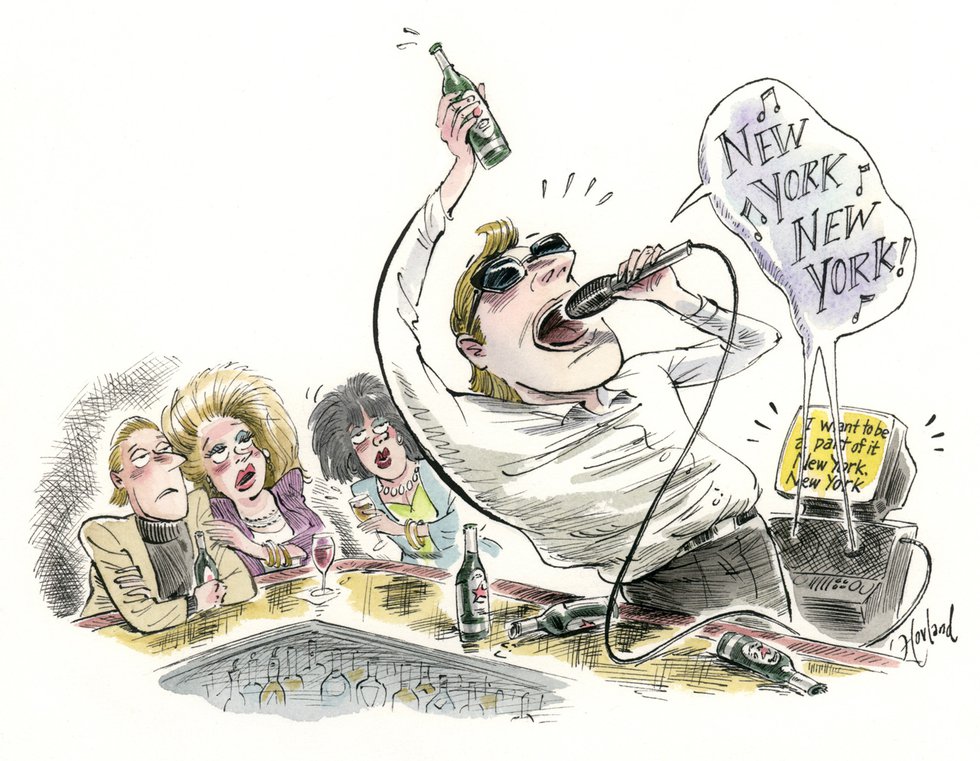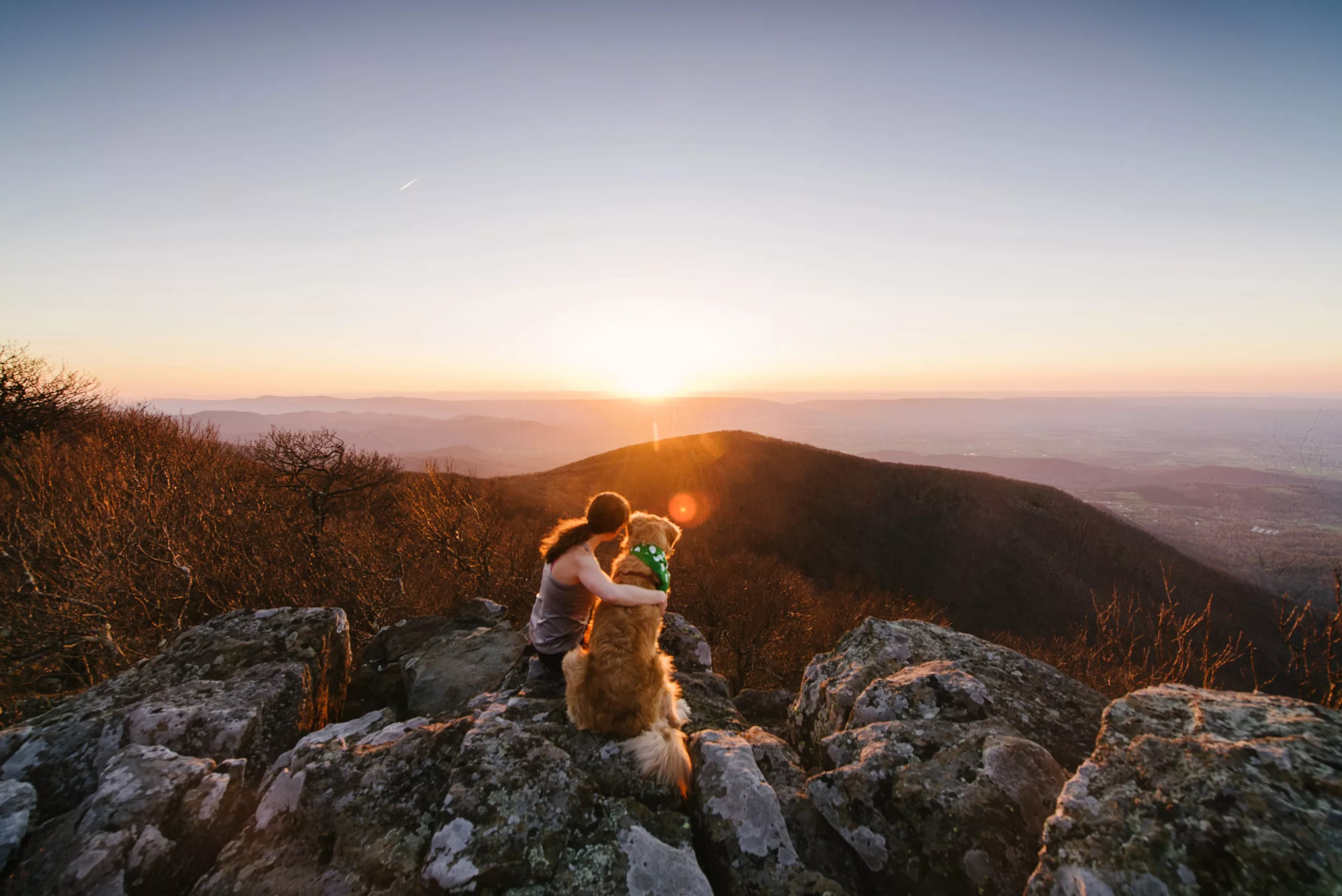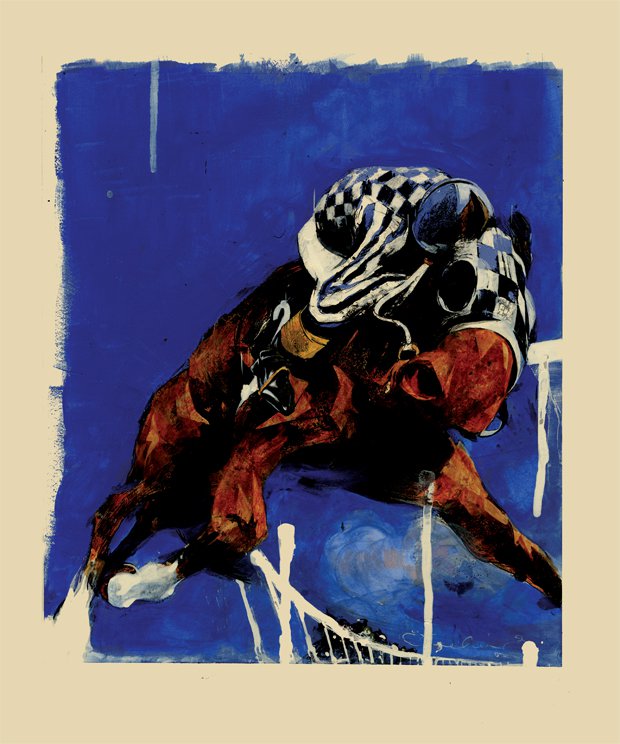Karaoke ushers in the ’90s.

Illustration by Gary Hovland
Maybe you recall “follow the bouncing ball,” a sing-along popular on movie screens from the ’20s to the ’50s, and rerun on television into the ’70s. A round dot gamboled up and down, following the lyrics at the bottom of the screen while marking the rhythm of the music track. But the viewers provided the vocals. Now fast-forward a couple of decades, apply hot new audio and video technology, put it center stage in a club or restaurant, and you have something similar, but on steroids and with an audience. It’s karaoke!
We’ve all done it, had it inflicted on us, or seen it in a movie, but in 1991, most of us didn’t yet know it. When the Centreville Times profiled a new trend that offered the prospect of singing along, “but in public instead of in the shower,” it noted the chance for “all of you singer ‘wannabes’ to fulfill the dream of a lifetime”: Wednesday nights at footballer Joe Theismann’s restaurant in Vienna.
Running the show at Theismann’s, Steve Drucker and Ivan Nedelcovic, acutely aware of the ham languishing in us all, founded You Sing the Hits to take karaoke to a salivating audience ready to put that ham on some rye. “The result: instant stardom,” declared the Times. Karaoke, it went on, is “Japanese slang for ‘empty orchestra’”—a band sans vocalist. The lyrics were displayed onscreen, and a lone microphone invited audience members to complete the combo.
Drucker and Nedelcovic had more than 800 songs to pick from, some of the numbers 40 years old. “Everybody likes to sing,” Drucker said. “It provides an ‘adrenaline rush.’” Plus, it’s very social. “You make friends left and right.” It’s Cheers, he said. (You remember Cheers.) Brave new singers belted out “Love Shack,” by the B-52s [Tiiiiiiiiiiiiiiiiiiiiiiiin roof! Rusted!], “Forever and Ever, Amen,” by Randy Travis and “What a Feeling,” from Flashdance. “We’ve had a 6-year-old sing ‘Twinkle, Twinkle, Little Star,’” Drucker said, “and older people do ‘New York, New York.’”
Now Theismann’s no longer offers karaoke, but plenty of other places do. Joe Luciano, owner of Williamsburg’s Panda Entertainment, had long deejayed at weddings and other events, but four years ago he added karaoke to the playlist, and it has been a huge hit. He churns up prospective stars at the ’Burg’s Corner Pocket and Triangle and every year rocks Norfolk at Eastern Virginia Medical School’s Christmas party.
Thanks to enormous hard drives unfathomed in 1991, Luciano easily hauls around 176,000 (!) songs on a laptop. TV and sound are much improved, and the mics are wireless. But the singers are more demanding. “Some have a playlist they want to sing,” he says, “and if you don’t have the songs, they go somewhere else. But if you do, they follow you around.” Today’s talent selects its songs from Luciano’s website. Twenty-five years back, it was pot luck and a printed list.
The closest he’s come to having a celeb sing at his shows—so far—is a young woman from Williamsburg who was on America’s Got Talent. At the other end of the continuum is a guy who is not exactly stellar and picks songs that drag out for five, six, seven minutes. “When I start getting google eyes from the bartender, it means this guy’s gotta stop or he’s going to kill us all,” says Luciano. But he says the audiences are kind and never boo, even with a turkey at the mic.
In 2004, Daisuke Inoue received the Ig Nobel Peace Prize for inventing karaoke, “providing an entirely new way for people to learn to tolerate each other,” explained the Annals of Improbable Research, sponsor of the parody Nobels. If it makes the atmosphere like Cheers and if the folks don’t boo, it earned the award.









